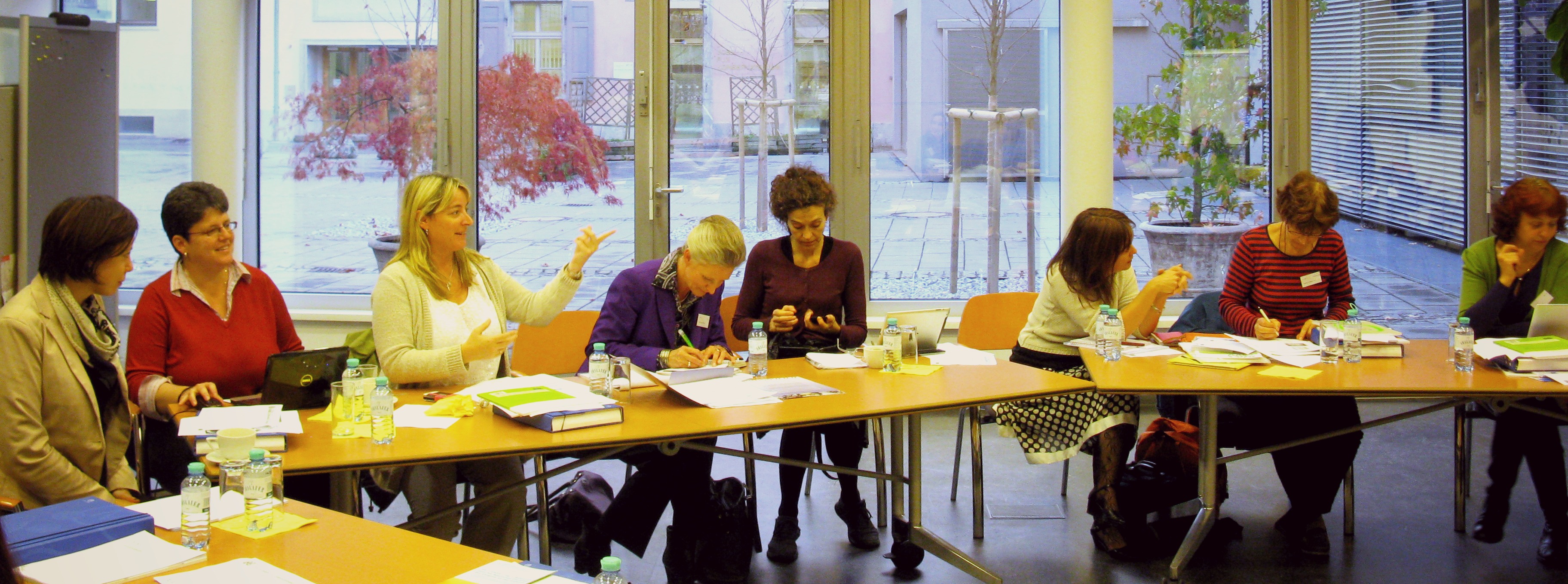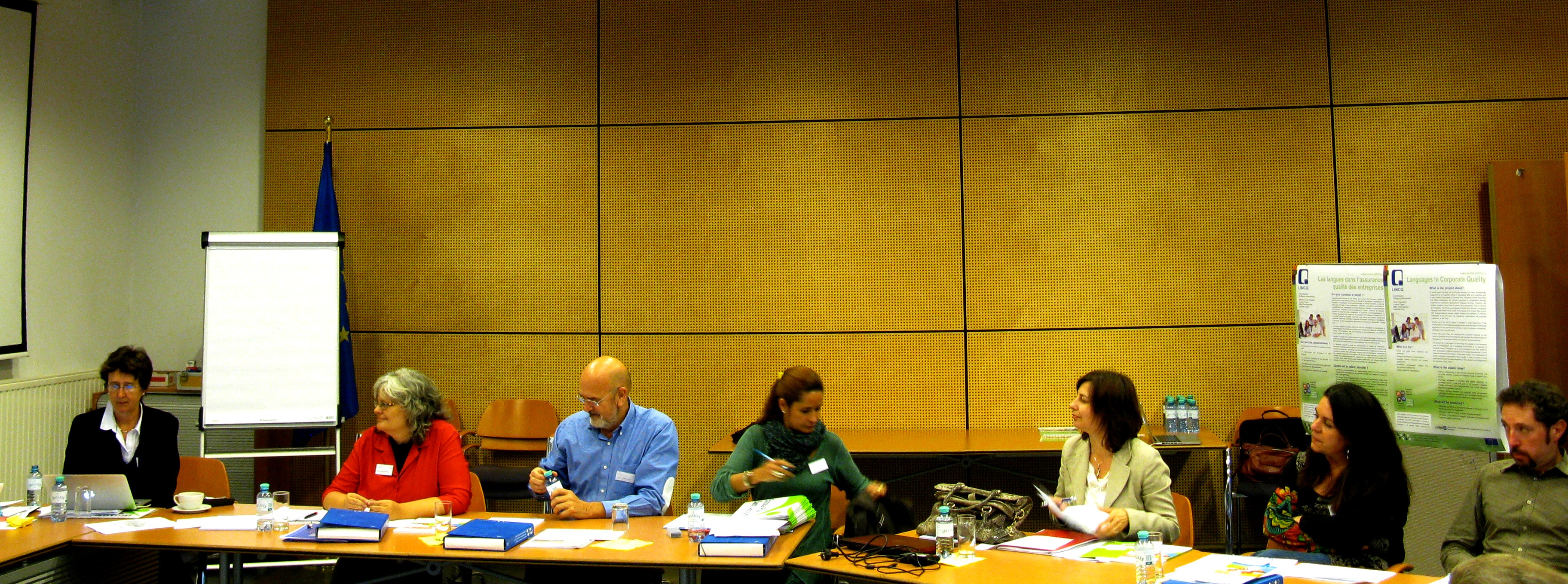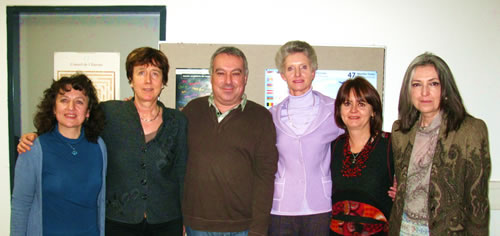IPPIE – Project - Involving Parents in Plurilingual and Intercultural Education: Where are we? What did we do in 2013?
In 2013 the team, that keep in contact and communicate constantly, met twice:
- In February (Expert meeting) for a team meeting aimed at planning actions to be carried out in the two years of the project;
- In October (Network meeting) to build up the first network of mediators as well as to deepen:
- our knowledge about the obstacles to the involvement of parents in plurilingual and intercultural education,
- our knowledge about plural practices and activities including parents,
- our knowledge about arguments supporting the involvement of parents in plurilingual and intercultural education,
- our ideas about how to diffuse these practices and to persuade reluctant or not informed education actors about the advantages and the benefits of practices like these.
In 2013 the IPPIE team, helped by the European Parents Association, carried out a survey in 5 countries in order to deepen the knowledge of the existing practices, of the benefits observed and of the reasons of the involvement or of the absence of involvement of parents in the education system. 75 teachers and 172 parents answered to the questions in our survey. On the one hand, the survey confirmed the weakness of the relationships schools/ families and the confinement of parental involvement (parents are mostly invited to school to receive general information about school contents or to participated in preparing a school party), on the other hand it gives the opportunity to move forward, because it permitted to identify the obstacles to parental involvement in Plurilingual and Intercultural Education in a better way (for example : overloaded school programs, which are focused on the schooling language and some languages ; fear of opening to parents a province that is considered first of all the province of the teacher ; absence of information about the forms of parental involvement, fear of stigmatizing families that are already perceived as « foreigner », fear of the reaction of families belonging to the minority language group …). Moreover, the survey gave the opportunity to collect the point of view of the actors (teachers and parents) about positive effects of the involvement of families. As teachers and parents witnessed their involvement in activities related to the development of Plurilingual and Intercultural Education, they confirmed that all this has a strong impact on curiosity towards languages and cultures, on the feeling of social integration parents of foreigner origin have, on the global relationships between school and families, on self-confidence and on self-esteem of children whose family language is not the majority language of the country they live in, as well as on the development of metalinguistic and metaphonological skills, that are propitious to language learning, including the learning of the schooling language.
With the network of mediators built up in October, the IPPIE team concentrate now on the diffusion of the project. Besides the diffusion actions carried out in teacher training meetings (these actions are carried out by the IPPIE team members and by its mediators), several actions addressed to the great audience were started and resources were diffused:
- a digital dossier taking an inventory of articles related to advantages and benefits of the IPPIE project. This dossier, which was worked out by our mediator Damien Boisset as well as by his team of the « Approches Cultures et Territoires Association » (France) is available on line and has been diffused among over 3000 contacts : //www.approches.fr/spip.php?page=dossier&id_mot=236)
- diffusion on line of an article written by our mediator Maria del Carmen Gonzalez Andre to enhance involvement of parents in creating a common culture (Catalonia). : « ‘Ballem el Joc Perdut’, construint una cultura comuna inclusiva a l’Escola Pia de Sant Antoni » sur //www.publicacionsepc.cat/papers40/joc-perdut/
- creation of a Facebook profile (created and supervised by Arantxa Garcia de Sola and Xavier Pascual Calvo, Catalonia and Spain) to diffuse the project and some links to articles and activities related to the project: https://www.facebook.com/pages/Menos-vallas-en-nuestros-coles/1435061180062507
- construction of a video documentary (under development, supervised by Stéphanie Clerc) aimed at showing parental involvement practices in France and in Catalonia
- creation of a website (under development), supervised by Brigitte Gerber, who takes an inventory of resources for teachers and parents : //parents.ecml.at/en-us/Resources
- translation into English of the information about the de resources by Anna Maria Curci
- production an information leaflet addressed to parents (under development).
Written by: Stéphanie Clerc, January 2014
English translation by: Anna Maria Curci
Network meeting, 30-31 October 2013

- Drawing on the results of a survey which was carried out by the members of the IPPIE team and by one of its partners (Arja Krauchenberg) in different countries (Austria, Spain, France, Switzerland, Italy) among teachers (75) and parents (172) as well as on research studies and observations made by the network meeting participants, we were able to identify on the one hand the major obstacles to the development of plurilingual and intercultural education practices involving parents and, on the other hand, the existing practices that are based on cooperation between parents and teachers in plurilingual and intercultural education.
We observed that:
- the national contexts do not offer the same « openings» to this kind of education. In France, for example, there is a strong emphasis on the mastery of the French language and culture and social representations are not really open to the languages and cultures of migration, whereas Catalonia and Switzerland are more open to linguistic and cultural otherness. Catalonia, with its « education communities», offers perspectives on which other European countries could draw for the promotion of family involvement in plurilingual and intercultural education.
- « awakening to languages » approaches are particularly suited to parental involvement.
Among the obstacles identified, with both teachers and parents, one can mention misconceptions about bi/plurilingualism (e.g. the fear that it can hinder the development of language skills in the school language and therefore school success in the main school language), the fear of not « having the know-how» (expressed by parents as well as by teachers), the fear of parent interference in educational questions, considered to be the province of teachers (which makes it difficult to envisage an educational community). This analysis shows the importance of disseminating information relating to the advantages of plurilingual and intercultural approaches; indeed, modifying representations is an essential prerequisite before educators can engage in the project.
Consequently, the project team will focus its efforts on making the following documents available to a large audience:
- information documents (a leaflet and a video documentary) about the benefits of plurilingual and intercultural education;
- descriptions of activities and existing projects that promote parental involvement in schools within the framework of plurilingual and intercultural education.
The IPPIE project team and the network members have set the following goals for the workshop in April 2014:
- collecting and describing existing practices (and – as far as possible –video resources, to be used for the production of the final video document)
- mediating the project and creating relationships with people whose commitment can support, in a way that is inclusive of families, the development of plurilingual and intercultural education.

CIEP, the national contact point for the ECML in France, highlights the network meeting of the ECML project "FREPA for parents: Involving parents in plurilingual and intercultural education" in the Centre's newsletter,
Courriel européen des langues no. 29 (November 2013, p. 3, French only).
First expert meeting, 11-12 February 2013

The project team has made a first survey of the obstacles and aids to the development of plurilingual and intercultural education practices involving parents, by drawing upon information collected from teachers and parents (pre-enquiry phase through interviews and questionnaires which were carried out before the first expert meeting) and a thorough knowledge of parents' associations (thanks to Arja Krauchenberg of the European Parents Association).
Among the obstacles identified, both on the teachers’ and the parents’ side, erroneous conceptions of bi/plurilingualism (fear that plurilingualism can make the development of language competences which are legitimated in society and at school dangerously complex, particularly for school achievements in the language of schooling) appear, as well as the fear of not « being able » (on the parents’ side «how can we intervene in the classroom ? How can we share and transmit knowledge when we aren't teachers? » and on the teachers’ side «how can we manage the presence of the parents in the classroom? How can we justify this activity in the curricula?»). The project team will focus its efforts accordingly on the provision for a large audience:
- of information papers (leaflets, pictures, videos, bibliographical references on the project website) about the assets of pluringual and intercultural education;
- of descriptive files about existing practices and about tools which were conceived within the framework of plurilingual and intercultural education involving parents.
-For the network meeting in October 2013 the IPEPI project team is aiming for:
- the collection and the description of existing practices,
- weaving connections with people who are committed to plurilingual and intercultural education involving parents, as well as with people who are influential within associations (active in networks) and are not committed to this kind kind of practices
- and the analysis of the needs of the target audiences (parents, different education partners, teachers).